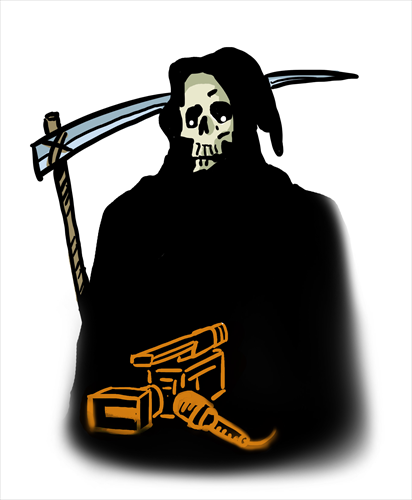African media fails to tackle Ebola

Illustration: Liu Rui/GT
Reporters have always faced life-threatening experiences in war zones. It is a risk that comes with the job. "Wrong time, wrong place, wrong people" is an inevitable hazard for frontline journalists. In the recent years, however, there has been a terrifying escalation in attacks.
This year alone has seen the killing of 50 journalists, nine media assistants and 17 netizen and citizen journalists worldwide. More than 179 journalists, 12 media assistants and 188 netizens have been imprisoned.
Journalism is a risky trade. In particular, those practicing investigative journalism that seeks to hold the powerful accountable have been attacked, maimed and killed for seeking to reveal the truth.
For instance, two years ago, Eduardo Carvalho, the owner-editor of a Brazilian website, renowned for its in-depth investigative reporting was shot dead in from of his home after receiving death threats. His site, Ultima Hora News, specialized in publishing stories about corruption and abuse of authority, and was openly critical of both politicians and police.
Besides this genre of journalism that is ever under attack, reporters' lives have also been lost when on the frontline covering armed conflicts.
The killing of Anastasia Baburova, 25, in Moscow in January 2009, particularly brought to the fore the heated debate on whether journalists should be armed while carrying out their duties in unstable regions. Despite the grave risks, journalists still do not carry weapons.
Ebola has brought a new type of risk to reporting. So far, the disease has killed more people than in all the previous outbreaks since the virus was first identified in 1976.
This outbreak is violent and massive because the virus hit a region whose health infrastructure is in a sorry state. West Africa had no previous experience of the virus, and it quickly spread to densely populated regions in urban areas.
Now, questions are lingering on the role journalists should play in such hot spots. Crucially, the media in Africa are today under huge criticism for letting the Western media run away with an African story.
There is no doubt that media is the engine that keeps democratic nations running. To a large extend, the media's central role is to inform people about new and current affairs. Its role has become so crucial in the society that it informs the decisions of the populace for it informs, educates and entertains.
It is sad that African media outlets have shied away from being at the front line on reporting about the Ebola virus. CNN, one of the American stations that has heavily criticized for sensationalist coverage of the outbreak, for instance, sent its Beijing correspondent David McKenzie to report the outbreak.
While there are many risks that come with covering such a life-threatening disease from the front line, McKenzie not long ago from Sierra Leone explained how they were staying safe while filing stories.
"This is more about just having some basic things, like chlorine and water and all of this, to protect yourself, but also just to calm yourself down in what can be a very emotional and scary reporting trip," he said.
Other international media outlets have employed cutting-edge strategies to ensure that they report on the epidemic.
The Associated Press, for instance, is using a network of reliable stringers in Guinea, Liberia and Sierra Leone.
To minimize the chances of contracting the deadly virus, the international media has formulated a series of protocols. They include not entering isolation units, avoiding shaking of hands, avoiding funerals and any gatherings, not eating bush meat and using alcohol-based hand sanitizers.
Stringers are human beings, as much as some newsrooms might occasionally forget this, and the Associated Press has instructed them not to put themselves in any imminent danger.
This has however been very challenging to photographers and videographers who have to get sharp and clear shots of their subjects.
It is pathetic that African media outlets, despite claiming that they lack enough finances, have failed to send its reporters on the front line in West Africa, and instead opted to rely on agencies for the news.
In the world of today, media has become a basic need. By being on the front line, the African media, many of which speak in the languages of ordinary people rather than the global elite, could have educated the masses about the virus, the precautions they need to take, how the virus is transmitted, as well as its symptoms and prevention and control.
Moral excuses aside, African journalists failed Africans, particularly our brothers and sisters in West Africa. African journalists should have been sent to West Africa, but cautioned to keep their distance both emotionally and physically. Objectivity, sadly, thrives when reporters are able to separate themselves from the story in order to best report the news.
I mourn with West Africans, I mourn for the African media that have refused to play at the highest level.
The author is a journalist on African issues based in Nairobi, Kenya. mkapchanga@gmail.com